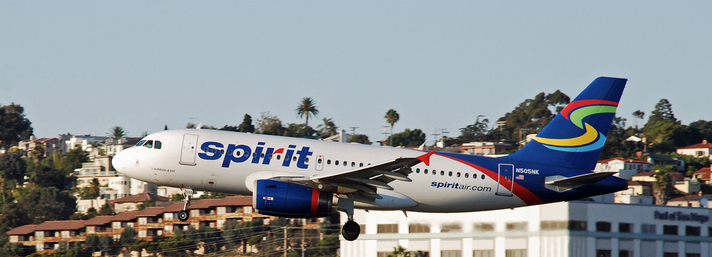Spirit Airlines Brings Up Rear In Latest Airline Customer-Satisfaction Scores
Historically, the industry has been among the worst of the dozens of sectors scored by the ACSI survey, the latest scores show some overall improvement.
The average score for airlines has improved two percentage points from 2014 to a 71 out of a possible 100. Additionally, more airlines are on the positive side of the industry average.
JetBlue once again scored the highest of all airlines with an 81, the only score over the 80-point threshold, and a 2 point improvement over the previous year.
What remains to be seen is how JetBlue’s plan to start charging for checked bags will impact its score, and whether it will break the airline’s streak of four straight years as ACSI champ.
Southwest was the last airline to beat JetBlue, but its 2015 score remained unchanged from 2014. Luckily for the airline, which has been criticized by some travelers and employees for focusing on growth over customer service, a 78 is good enough to keep the airline in second place.
“Southwest appears to have successfully managed its AirTran acquisition, but its expansion into international travel may cause some turbulence ahead,” says Claes Fornell, ACSI Chairman and founder.
ACSI newcomer Alaska Airlines made an above-average debut with a score of 75 for third place. No other airlines scored above the industry average.
The other first-timers on the ACSI scorecard fared much worse. Allegiant, which has recently been hit with a very public labor dispute, earned a score of 65.
Denver-based Frontier Airlines only managed to score a 58 — two points below the nearest veteran carrier — in its first go-around.
As mentioned above, the lowest-scoring carrier in the survey was Spirit. The bargain carrier earned a ASCI-low 54, tying it with Time Warner Cable’s broadband service for the worst result currently on the survey.
“Spirit may offer low fares, but its score reflects its minimalist approach to customer service,” says Fornell.
Of the largest carriers, only Southwest scored above industry average, though Delta did manage to keep pace with the industry as a whole. However, its score of 71 remained unchanged from 2014.
In fact, all three remaining legacy carriers saw zero change in their scores from last year. American scored a below-average 66; this could be viewed as a small positive, as many airlines experience a dip in score immediately after a merger. The combination of American and US Airways didn’t seem to impact the merged airline’s score.
United remains on the bottom of the major carriers, with only a 60 to show for its efforts. While that’s the same score as last year, United’s ACSI score has dropped nearly 16% over the last two decades.
In terms of things that bug travelers the most, the lack of seat comfort tops the list. Airlines only scored 65 in this category, the worst of any customer satisfaction aspect. On the plus side, passengers are happier with in-flight services such as entertainment options. This score increased by 7% to 72.
As an industry, Airlines still only rank above Internet service providers, subscription television and health insurance.
“Airlines are doing a better job of getting travelers to their destinations on time, with less frustration over baggage,” explains ACSI Director David VanAmburg about the slight uptick in the average score.
ACSI also scored a variety of online travel-booking sites, but the effort may not be worth it. The overall industry average has only changed 1.3% since the survey began including these sites. And only two percentage points separate the top-scoring site, Expedia (77), from the lowest score — which happened to be a three-way tie of Orbitz, Priceline, and Travelocity (75 each).
Want more consumer news? Visit our parent organization, Consumer Reports, for the latest on scams, recalls, and other consumer issues.


